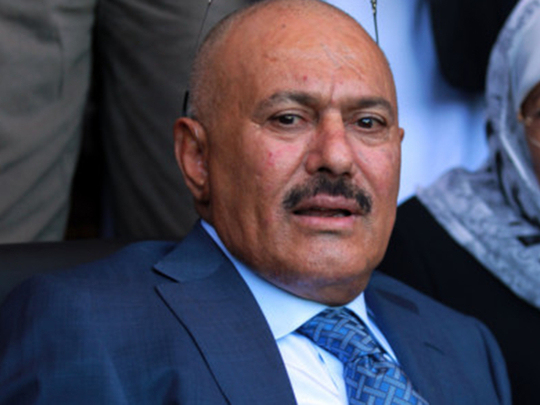
Al Mukalla: A number of senior members of the party of former president of Yemen, Ali Abdullah Saleh, have begun arriving in the Saudi capital fueling speculations that the party is going through a new wave of defections.
Former president Saleh, who also head General People’s Congress or GPC, has been blacklisted by the international community after being found using his leverage on army units to pave the way for Al Houthis expansion across the country. he The UN Security Council has imposed sanctions on Saleh and his son Ahmad, who was once commanding the elite Republican Guard.
This week, Ahmad Obied Bin Dhaghar and Sultan Al Baraki, two seniors GPC figures who widely seen as Saleh’s right hands and many others have defected from Saleh’s party and joined pro-Hadi figures in the Saudi capital.
Most of the figures have remained media-shy, except Mohammad Al Shayef, a powerful tribal leader, who has made frequent appearances on television backing Saudi-led air strikes and Yemeni president Abd Rabbo Mansour Hadi.
Saleh’s party has downplaye the defections, saying that its members are ‘on a mission’ in Riyadh and would return back to Yemen.
Ahmad Al Sufi, a spokesperson for the former president, told Gulf News that the party had assigned a delegation of senior members including Bin Dhaghar and Al Baraki, to travel the Saudi capital for the purpose of advocating a ceasefire.
“They are presenting our proposal in Riyadh that includes halting Saudi aggression on Yemen,” Al Sufi said in a telephone interview.
In March, Saudi Arabia formed a coalition of allied countries and launched air strikes on military targets in Yemen aimed at blunting Al Houthis and Saleh’s forces advance into the south Yemen.
Saleh’s party suffered its first big defections early 2011 when suspected pro-Saleh snipers killed 55 anti-regime protesters in the Yemeni capital.
The mass killing promoted many military, tribal and civilian members of the party to switch sides and support Saleh’s opponents.
Saleh insisted his party ‘got rid of corrupt figures’.
The second wave of defections appeared in 2014 in the wake of a UN decision imposing sanctions on the former president and two members of Al Houthi movement, accused of derailing the political process in the country. Saleh and allied figures in the party accused Hadi of requesting the UNSC to punish the party’s leader. Some seniors of the party, including Abdul Kareem Al Aryani, a veteran politician and former aide to Saleh, turned their back on Saleh and joined Hadi’s side. In turn, Saleh came to the defense of Al Houthis when they overthrew president Hadi, with many reports emerging that he encouraged them to do so.
Saudi-led strikes have thwarted Saleh’s coup, according to analysts.
“Saleh now has two choices: two end his alliance with Al Houthis or lose everything,” Abdul Salam Mohammad, director of the Abbad think tank centre in Sana’a, told Gulf News.
“The GPC delegations are in Riyadh offering concessions in a bid to salvage what remains of their political party,” he added.












